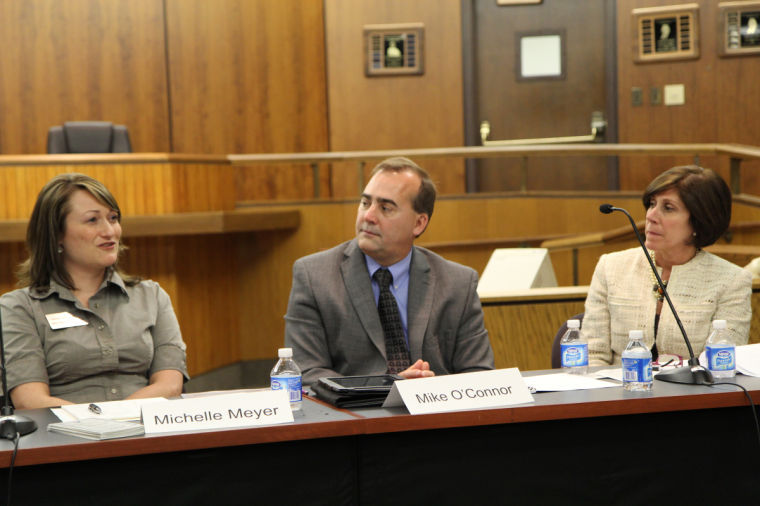College of Law hosts Supreme Court’s Commission meeting
Mike O’Connor, Prairie State Legal Services Representative (center) and Mary S. Schostok, Second Judicial Ward Justice (right) listen to Michelle Meyer, Executive Director of Mutual Ground speak about encountering language barries within in her non-profit group, which helps victims of domestic and sexual abuse on Wednesday at the Commission on Access to Justice Listening Conference in Swen Parson Hall.
May 1, 2013
Lawyers and attorneys from across Illinois gathered at NIU to discuss injustice in court representation.
The College of Law hosted the Illinois Supreme Court’s Commission on Access to Justice listening conference Wednesday. The Commission on Access to Justice consists of 11 lawyers, judges and a clerk of the court chosen by the Illinois Supreme Court and other Illinois foundations.
Some issues discussed were representing those with language barriers or mental illness. Thomas Kilbride, Illinois Supreme Court chief justice said helping the vulnerable can benefit the entire state.
“We are trying to improve the system,” Kilbride said. “We are trying to help the poor and vulnerable, and by helping them we can help everyone across the board.”
The conference provided a chance for lawyers to express their opinions about the problems within the court system. Panel members from the Second Appellate District and the Third Appellate District answered questions and provided expert opinion.
DeKalb is one of the 13 counties in the second district.
Commission member Michelle Meyer is the executive director of the organization Mutual Ground, which specializes in helping victims of domestic violence and sexual assault. According to The U.S. Census Bureau, within the second appellate district of Illinois 202,200 people can only speak Spanish. Meyer said in court of law, it is difficult for Spanish-speaking people to be equally represented.
“The people I work with are disadvantaged in the court system,” Meyer said. “Twenty-five percent are Hispanic; half of them speak Spanish only. It’s very difficult if you don’t know English. We should get more information in Spanish. They should be able to walk into a court room and get an order of protection, and that’s not happening right now.”
The commission’s goals for helping the poor and vulnerable have made strides, but there needs to be a joint effort around the state, according to the Second Appellate District panel. Mary Schostok, second judicial district judge, said specific changes must be made by the court system to fix the concerns of the commission members.
“It’s incumbent among all of us in the court system to reach out and have websites to help these individuals,” Schostok said. “Maybe assist those counties that may not be proficient in web design. Provide help desks or help centers. We need to encourage pro-bono work…of lawyers and we need to recognize them somehow.”
The commission encourages ideas and feedback be submitted from the public. The state of Illinois wants input on how to benefit the state legally and equally, Kilbride said.
“We believe the court system in Illinois is excellent, but not perfect,” Kilbride said.
The goal of the commission is to provide legal help to the less fortunate citizens within the state, Kilbride said. The commission was first established on June 13. Despite the novelty of the organization, it has already provided help for those in legal binds, said Commission Chairman Jeffrey Colman. Colman said Illinois was behind in legal areas prior to the commission’s establishment.
“As of a year ago, Mississippi and Illinois were the only states in the country without standardized forms to use divorce papers or getting name changes,” Colman said. “We will be rolling out a sleet of forms within the next 60 days.”
The next Illinois Supreme Court Commission on Access to Justice listening conference will be held on May 30 at the University of Illinois College of Law Building.







